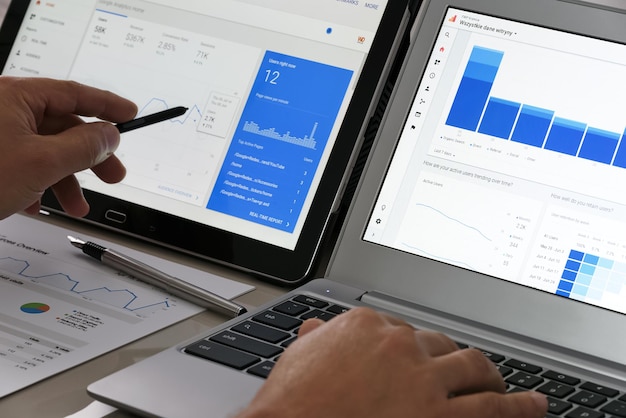Google Analytics is a powerful web analytics tool that provides valuable insights into the performance of your website. It offers a wide range of data and metrics that help you understand your audience, track website traffic, measure the effectiveness of marketing campaigns, and make informed decisions to optimize your online presence. Here are some key reasons why Google Analytics is important:
- Audience analysis: Google Analytics provides detailed information about your website visitors, including their demographics, interests, location, and behavior. This data allows you to understand your audience better, identify trends, and tailor your content to their preferences.
- Website performance tracking: By monitoring key metrics such as page views, bounce rate, average session duration, and conversion rates, you can assess the performance of your website. It helps you identify which pages are performing well, which need improvement, and how users engage with your content.
- Goal tracking: Google Analytics allows you to set up and track goals on your site, such as newsletter sign-ups, downloads, or purchases. By measuring goal completions and analyzing the paths users take to achieve them, you can evaluate the effectiveness of your site in achieving its objectives.
- Traffic sources and campaigns: Understanding where your website traffic comes from is crucial for optimizing your marketing efforts. Google Analytics provides detailed data on traffic sources, including organic search, referrals, social media, and paid advertising. It helps you identify which channels are driving the most traffic and conversions, allowing you to allocate resources effectively.
- Content analysis: By analyzing the performance of individual blog posts, you can gain insights into the type of content that resonates with your audience. Google Analytics shows metrics such as page views, time on page, and social shares for each post, enabling you to identify popular topics, improve engagement, and create more impactful content.
- User behavior analysis: Google Analytics offers tools like behavior flow and event tracking, which allow you to understand how users navigate through your website, which pages they visit, and how they interact with your content. This information helps you optimize your website’s user experience and identify any barriers or issues that might hinder conversions.
- Conversion tracking: Whether your website aims to generate leads, drive e-commerce sales, or encourage other specific actions, Google Analytics provides conversion tracking capabilities. It enables you to measure the effectiveness of your marketing campaigns, identify high-converting pages, and make data-driven decisions to improve your conversion rates.
- Performance comparison and benchmarking: Google Analytics allows you to compare your website’s performance over time, track progress, and set benchmarks. By monitoring key metrics and analyzing trends, you can identify areas for improvement and evaluate the impact of changes or optimizations you make to your website.
In summary, Google Analytics is essential for any website owner or digital marketer who wants to understand their audience, track website performance, optimize content, and make data-driven decisions. It provides valuable insights that help improve user experience, increase engagement, and drive conversions, ultimately contributing to the success of your website.

